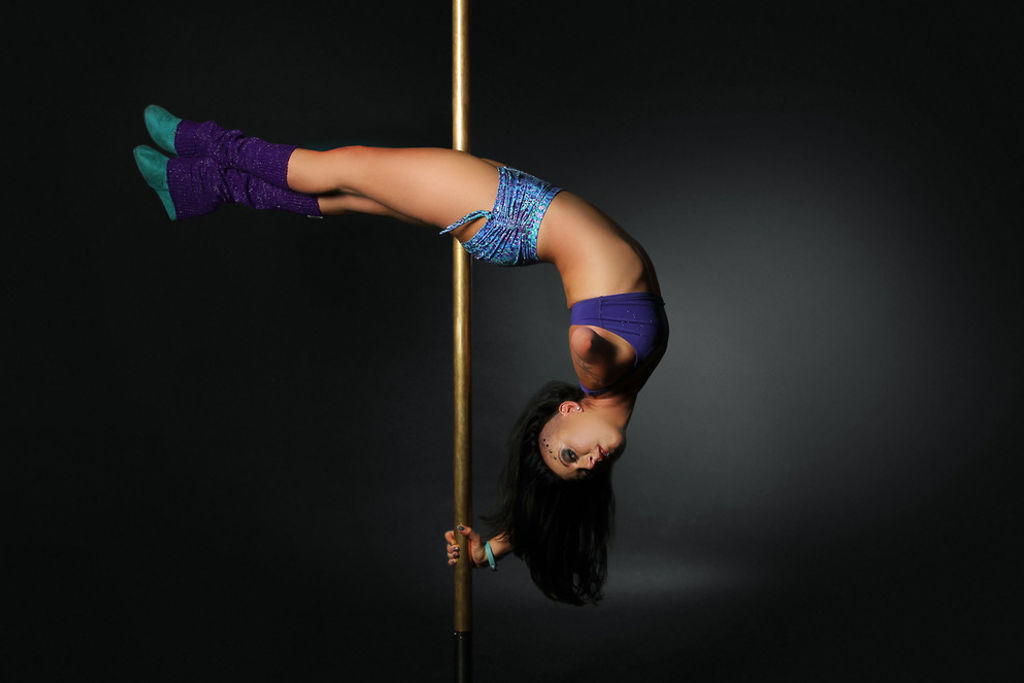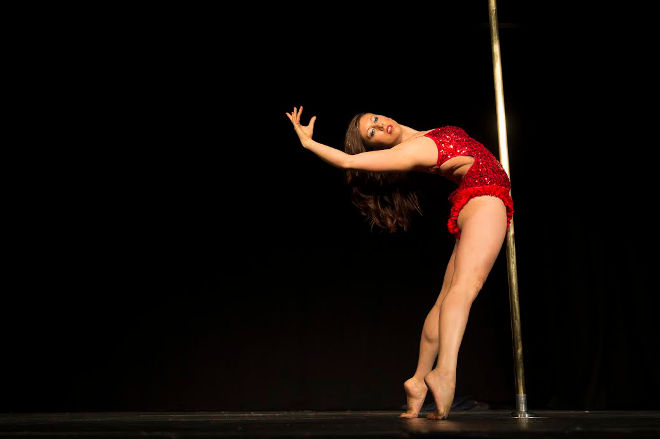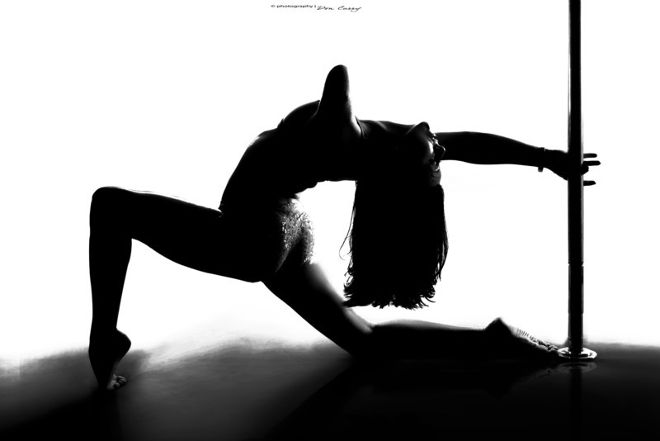Meet Deb Roach, A One-Armed Australian Pole Dancer Making It In The UK
"I won’t be made uncomfortable because society tells me that ten fingers is the only thing that looks pretty.”

Arty types and political leaders often moan about Australia’s talent bleed, first from regional areas to the creative hubs of Melbourne and Sydney, and later abroad to places like London, Berlin and New York City. But last year, one of our most promising performing artists slipped overseas almost unnoticed.
With little fanfare, one-armed pole dancer Deb Roach, lamenting Australia’s near non-existent disability sports and arts sector, gave up trying to make it in her home town and moved to the other side of the planet. She planted herself in London and is carving out an enviable career in a city that’s increasingly embracing the contribution of people with disabilities in creative pursuits.
It’s a far cry from back home, where a fellow cyclist, having heard about Roach’s win in the disabled division of the 2012 International Pole Championships, told her: “You disabled people have no business pole dancing. That stuff’s hot and disability’s not.” The idiotic comment only cemented Roach’s determination to pursue pole dancing. She promptly quit cycling — which she’d taken up, in hopes of securing a spot on Australia’s Paralympic team — and threw herself into dancing.

Photo © Brad Edwards at Vertigo Photography
“It was about proving to myself that my own disabled body was just as physically attractive and capable of sensual movement as any other,” the 32-year-old says. “I’ve challenged that my whole life. I won’t be made uncomfortable because society tells me that ten fingers is the only thing that looks pretty.”
Roach was born with just one arm and suffered terribly at the hands of vicious bullies throughout her childhood in Sydney’s north western suburbs. She was kicked off her fifth grade netball team for “bringing the other girls’ performance down”. Once, at a dance camp when she was 14-years-old, a peer told her: “You may as well give up because dancing is an aesthetic pursuit and you’re only a broken line.”
Bullying, depression and drug and alcohol abuse
Roach hedges a little when I ask about those difficult childhood and teen years, when she felt rejected and isolated, suffered depression, struggled to accept herself and relied on a cocktail of drugs, alcohol and partying to get by. And then, in around 2004, after the constant partying landed her in hospital with pneumonia, Roach decided to turn her life around. She began running, taking yoga classes and returned to dancing.
“I’d thought my only way to win, to get ahead and to find my own success in the world was to forget about what was going on with me physically and just use my intellect,” she says. “But one day I was doing push ups in the park and a quite large woman said to me: ‘Geez, you make me feel like I’ve got no excuse’. That made me think about how I could help other people start their own fitness adventures and better look after their own bodies. I started really resenting sitting behind a desk in the corporate world when I’d finally found a way to use the way that I’d been born to help other people — and myself.”
She says she hates “inspiration porn”, and feels the disabled-girl-makes-good story has been “done to death”. “I purely appreciate recognition based on merit,” she says. It’s that merit that’s seen her perform all over the world, from South Korean television screens to Aussie nightclubs to private parties for England’s rich. She says her “contemporary lyrical or sexy flow”-style attracts fans from all walks of life: sports enthusiasts, amputee fetishists, yogis and women who love her can-do attitude — and next June, Roach will head to New Orleans for the International Pole Convention.
Finding strength, self-worth and, finally, international recognition
Roach ditched her stuffy IT career and has since found strength, health and self-worth as a yoga teacher, personal trainer, pole dancer and public speaker.
That merit-based recognition she craved is now coming in spades. She’s scored an Arts Council England exceptional talent visa that will allow her to call the UK home for almost three and a half years. She won a $10,000 Amplify Your Art grant from Accessible Arts NSW for skills development in circus art.
She’s landed a teaching gig at the London Academy of Pole Dance and is being coached by Bendy Kate, one of the UK’s most celebrated pole dancers. She has a US tour planned and is regularly invited to host workshops at yoga and acrobatics festivals worldwide, where her favourite party trick is single-armed handstands.
Perhaps most excitingly, Roach has just launched her own Pole Translation course, teaching pole dancing instructors how to incorporate yoga and integrated dance principals into classes for people with special needs and disabilities.
Pole dancing as a means of empowerment
“The idea is to use the pole as a kind of therapy, a little bit of healing and soul nourishment, and a means of empowerment, like it has been for me.”
Roach admits her lifestyle is often gruelling, as she faces the physical challenge of intense training every day. “I’ve had quite a few popped ribs just through overloading one side of my body all the time,” she says.
Then there’s the mental challenge of keeping her head in the game. “It’s not for everyone. People aren’t paying my way. I’m working fucking hard to support what I love,” she says. “You just have to believe in it and yourself. When you make a decision and you commit to it, you do it and you survive.”
–
Koren Helbig is an Australian freelance writer living in Spain. She blogs at She Makes Magic and tweets at @KorenHelbig.
Feature image © Don Curry Photography
